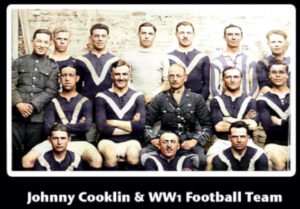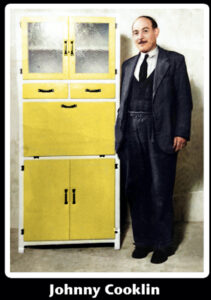Click HERE to go to the cemetery entry.
Leaving Latvia
In the 1890s John’s father, Mendel Kukla, was a Talmudic scholar in Latvia. When he was called up to the Russian army he wanted so much to complete his studies, that he sent his younger brother, Solomon, instead. Things did not work out well for Solomon in the army. One day he saw a Cossack maltreating a Jewish man. The man had been tied to a cart and was being dragged along the road. Solomon was so incensed that he attacked and killed the Cossack. Now Solomon was a wanted man and so the family had to flee the country.
Solomon, Mendel, Mendel’s pregnant wife Rosa and their daughter, Eva, boarded a train heading across the continent to Britain. It was on 18th January 1897, while the train was travelling through Germany, that Eva’s baby brother, John, was born, a fact confirmed by his naturalisation papers where it states, ‘Place of birth – on a train”.
Settling in Britain
When the family arrived in Britain they were given the name Cooklin by the immigration officers as being more familiar to his ear than Kukla. The family initially settled in London but with the arrival of more children they were attracted by an opportunity to farm in Canada. The Cooklin family had always been woodworkers and so their knowledge of farming practice was minimal but the gift of a free plot of land and the chance to settle in Canada seemed to be an offer they could not refuse so they packed up and left Britain. The venture was not a success. The land was uncultivated and unbelievably cold. John would never forget how he had to walk to school five miles each way in the snow and ice.
When the family returned to Britain they settled in Liverpool. John trained as a cabinet maker and joined his father, Mendel’s, business. Mendel had always been a cabinet maker, although he did go on to become a Rabbi in later years.
The footballer
 John was passionate about football. He loved playing it and he loved watching it. Throughout his life he always made sure that he lived within walking distance of a football ground. When he was called up to the army in the 1st World War he was stationed behind the lines in France as a quartermaster sergeant supplying equipment to the troops. It was during this time that he represented England playing football against France and can be seen in the photograph in the back row, third from the right.
John was passionate about football. He loved playing it and he loved watching it. Throughout his life he always made sure that he lived within walking distance of a football ground. When he was called up to the army in the 1st World War he was stationed behind the lines in France as a quartermaster sergeant supplying equipment to the troops. It was during this time that he represented England playing football against France and can be seen in the photograph in the back row, third from the right.
The cabinet maker
 John met Yetty at a cousin’s wedding and they married in 1922. They settled in Liverpool where they had five daughters: Marie, Preeva, Zena, Ida and Rosalie. In the mid-1930s the economic slump hit the family business and so John and his two brothers, Barney and Izzy, moved with their families to Leicester which was then regarded as a boom town. John had a small factory making kitchen cabinets. In 1939, with the outset of the 2nd World War, the factory was taken over by the government for the production of munitions but once war was over John opened another small factory in Braunstone Gate making kitchen cabinets once again.
John met Yetty at a cousin’s wedding and they married in 1922. They settled in Liverpool where they had five daughters: Marie, Preeva, Zena, Ida and Rosalie. In the mid-1930s the economic slump hit the family business and so John and his two brothers, Barney and Izzy, moved with their families to Leicester which was then regarded as a boom town. John had a small factory making kitchen cabinets. In 1939, with the outset of the 2nd World War, the factory was taken over by the government for the production of munitions but once war was over John opened another small factory in Braunstone Gate making kitchen cabinets once again.
The factory building almost came a cropper when several members of the family commissioned him to build a yacht and a motorboat. This he did and was extremely pleased with the results. In fact, the yacht went on to compete successfully in a number of races. The only problem was that the items were so big when completed that he had to remove the wall of his factory to get them out.
John and his brothers Barney and Izzy would go to Leicester Synagogue together every Saturday morning but in the afternoon during the season John would always walk to Filbert Street to watch Leicester City. This was why they lived in Narborough Road, close enough to walk to the football ground. It was in Narborough Road that his wife, Yetty, had a dress shop called Ann Rose. Yetty was an excellent seamstress and embroiderer and for many years took on the role of wardrobe mistress for the annual pantomime at the Little Theatre.
This account was written by his youngest daughter, Rosalie Shine. She describes her father as a big man, quiet and very gentle. She talks of a special and loving relationship that she and her four siblings had with their father. She remembers how delighted he was when they each produced grandchildren for him. John passed away on the 15th January 1967, three days before his 70th birthday, and is greatly missed by his family.